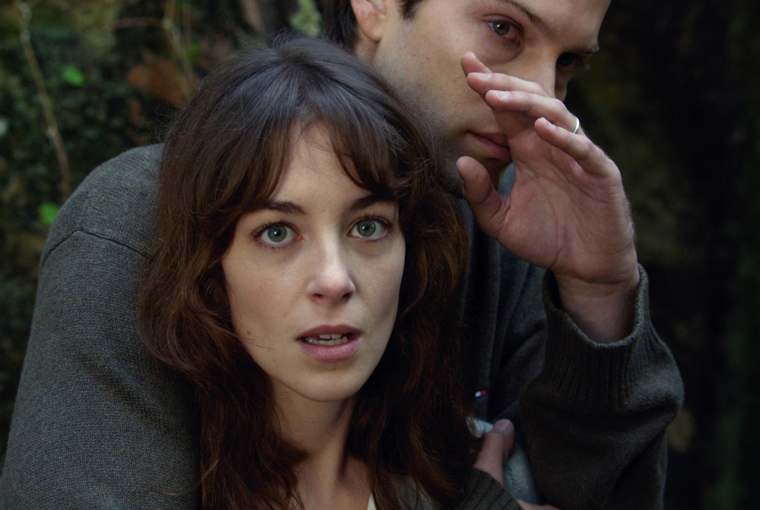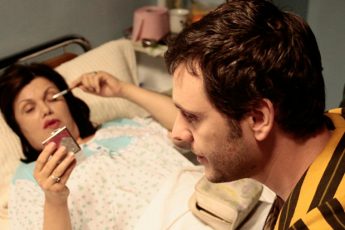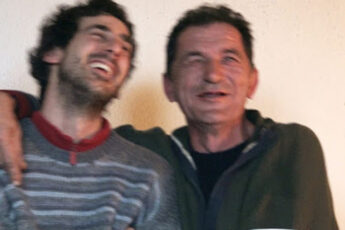
When you’re in love with someone unobtainable, everything that happens can seem like a sign. A speck of lint on their jacket? It must be there for a reason. They accidentally tread on your foot? It has to mean something. Their birthday falls on the same day as your grandfather’s did? This is obviously, without doubt, true love.
In Witold Gombrowicz’s most successful novel, Cosmos (1965), the narrator is quite fond of signs himself. When he arrives in a small country house with his friend Fuchs to study for his law exams, two things happen simultaneously. He falls in love with a daughter of the house, and he starts seeing strange signs everywhere. These signs obsess him: a sparrow hung by its neck from a tree, an arrow on the ceiling of the dining room and in his bedroom, missing blades of grass in the garden… Is it possible that these occurrences are interconnected, and connected in turn with his new love? The title of the novel, which evokes an eternal unity in which everything, everywhere, is connected, might just give us a clue.
Gombrowicz’s intimate novel was labeled ‘unadaptable’ for cinema. Indeed, one immediately recognizes the challenge of successfully translating its literary gems onto screen: “with an obscene, whorehouse smile he peeped into Katasia’s ribbons”, we read with delight. I can think of few directors more up to the task than Gombrowicz’s compatriot, director Andrzej Żuławski, who is well-known for his quirky and often extreme cinema.
Żuławski’s Cosmos won him the Best Director award at this year’s Locarno festival. Indeed, the directing is largely enjoyable – a poetic description of an eccentric family and their misadventures. The filming location adds to the poetic energy – the whole film was made in Portugal and the scenes from Sintra, near Lisbon are especially attractive.
The kinship between the narrator, Witold, and his fixation, Lena in the two versions of Cosmos discussed here are quite different. While the novel presents a simple, rather shy Lena, who seems to return none, or hardly any of Witold’s fascination, Żuławski transforms Lena into a crimsoned-mouthed sex goddess who stares with hungry, wild eyes at Witold, and provocatively wears double ponytails at the dinner table while smoking long cigarettes. Take this dinner table scene described in the novel. Witold is carefully watching Lena’s hands on the table:
There was a spoon nearby, half a centimeter from my hand and, exactly in the same way, a spoon lay half a centimeter from her hand — should I lean the side of my hand against the spoon? I can do it without attracting anyone’s attention, the distance is tiny. I’m doing it — my hand has just moved and is touching the spoon — and I see that her hand has also moved and is also touching the other spoon.”1
In spite of the excerpt’s slight ambiguity, Lena could be oblivious to Witold’s fanatical watching of her digits. The film version presents another story. Here we see a focussed Lena who watches Witold, and who moves her hands and spoon in perfect synchrony with Witold, who seems to command her every move. The two are almost noisy in their silence, and constantly throw naughty glances at each other. Even the featherbrained Fuchs notices this unsubtle cutlery-courtship.
And then there is the incident with Lena’s cat. Enraged by his love for Lena, and having spied on her and her husband during an intimate moment, Witold strangles her cat. While in the novel he does this calmly, in a rather detached way, the film version shows Witold in a fit of jealous passion, his whole body shaking in pain and internal struggle. The next day, when the cat is found hanging near the house, the novel describes Witold’s reaction succinctly: “Yet her cat was my cat, strangled by me. It was our cat.” In the film, Witold has yet another panic attack/shaking fit. The director thus presents us with a cynical view of this obsessional love, constantly retracing it to the narrator. One can’t help wondering how much Żuławski, now 75, can relate to a passionate student in the throes of a first passion. Indeed, one sees truth radiating from the older character Leon (played by Jean-Francois Balmer) that can’t be found in the acting of poor, hysterical, Witold.




Leave a Comment